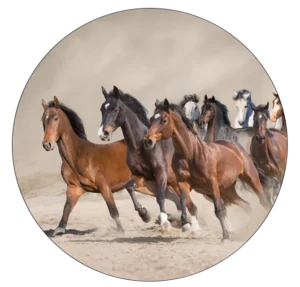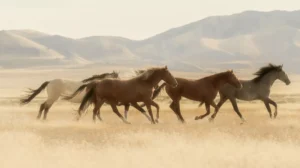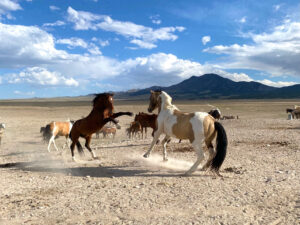Veterans for Mustangs
Helping veterans and wild horses by deploying former troops to apply humane fertility control strategies and limit reproduction of wild equines in the American West.

The Issue
The Veterans for Mustang Act represents another instance where helping animals helps us all.
Some U.S. troops struggle to find new purpose once they end their service in the military. More than half of the 2.6 million U.S. veterans from the Iraq and Afghanistan wars struggle with physical and mental health problems stemming from their service. On average, 22 soldiers kill themselves every day, which sadly is a higher death rate than the height of the Iraq War. To put this in perspective, statistically soldiers are more likely to die at home from their own hand than in war at the hands of the enemy.
Animals are medicine for so many people, with wildlife-watching experiences promoting mental health and dogs, cats, horses and other domesticated animals also providing so much social support to people. They are an antidote to loneliness and they make us feel better on so many levels.
When people can help animals in an active way, that’s yet one more way to promote mental health. The Veterans for Mustangs Act provides an incredible option for retired military personnel to help with the protection of wild horses and burros in the West.
Some ranchers and others complain about too many wild horses and burros, even though livestock outnumber the free-roaming equids by more than 35 to 1. Animal Wellness Action does support trying to address negative perceptions through humane fertility control of some horse and burro populations. That’s an alternative to inhumane, costly roundups and then the placement of horses in government-run holding facilities. Today, there are over 50,000 mustangs in holding pens, and that number will likely double in the next few years. Caring for tens of thousands of horses eats up more than half of the Bureau of Land Management’s budget for the entire Wild Horse and Burro program. It is a reckless use of resources, and it is inhumane and at odds with Americans’ wish to allow wild horses and burros to roam free.
The Solution
The Veterans for Mustangs Act would provide more personnel for humane fertility control, specifically military personnel, including so many of them with shooting skills. They would use a dart gun, under the direction of the Bureau of Land Management, to deliver fertility control remotely and slow the reproduction of horses in order to build great social carrying capacity for these wild equids.
By obviating the need for relentless and costly roundups, and then ongoing housing and feeding and care of the horses, the program has the potential to save millions in taxpayer dollars.
It is good for wild horses, and it is good for our former armed services members, who will benefit from the opportunity to bring more good into the world. When you live with purpose, and you interact with animals and help them, you feel better every day.
Read more about our campaign
Actions to Take
Other Campaigns

